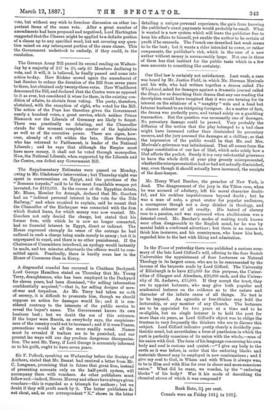In the Times of yesterday there was published a curious
sum- mary of the late Lord Gifford's will, offering to the four Scotch Universities the appointment of four Lecturers on Natural Theology in its largest sense, who are to be remunerated by the income of the bequests made by Lord Gifford. The University of Edinburgh is to have £25,000 for this purpose, the Univer- sities of Glasgow and Aberdeen, £20,000 each, and the Univer- sity of St. Andrews, £15,000. If they accept the trust, they are to appoint lecturers, who may give both popular and academical lectures on the evidence as to the nature and character of the infinite cause of all things. No test is to be imposed. An agnostic or free-thinker may hold the lectureship, or any member of any Church. The lecturers are to be appointed for two years at a time and to be re-eligible, but no single lecturer is to hold the post for more than six years, as Lord Gifford's object was to oblige the trustees to vary frequently the thinkers who are to discuss this subject. Lord Gifford indicates pretty clearly a decidedly pan- theistic creed, but nevertheless a form of pantheism in which the part is perfectly conscious of its union with the whole,—man of his union with God. The form of his language concerning his own body and soul is curious and quaint :—" I give my body to the earth as it was before, in order that the enduring blocks and materials thereof may be employed in new combinations ; and I give my soul to God, in Whom and with Whom it always was, to be in Him and with Him for ever in closer and more conscious union." What did he mean, we wonder, by the " enduring blocks" of his body? Was it his mode of describing the chemical atoms of which it was composed P


































 Previous page
Previous page